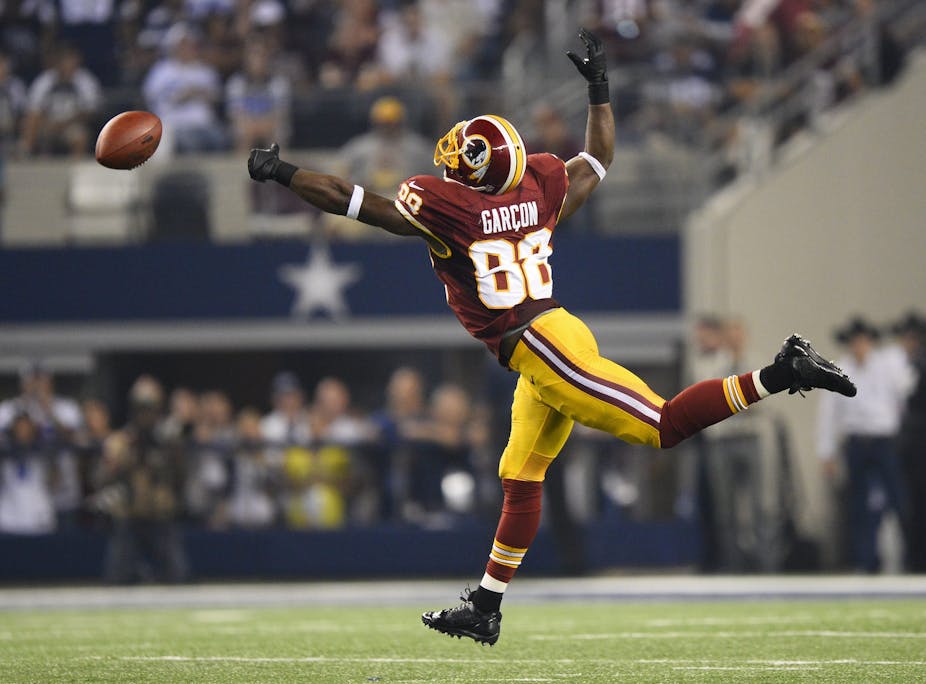On Wednesday the US Patent and Trademark Office cancelled the US trademark registration for the Washington Redskins football team.
This is a big victory for Native American groups, and an important development in US trademark law. But the most important thing to understand is that, as a legal matter, this means almost nothing to the Washington Redskins owner or to the National Football League (NFL).
But before we get into the legal effects of the trademark cancellation, let’s look at how we got here.

For years various Native American tribes have argued that the term “redskin” was disparaging of members of their ethnic groups, and so the team’s trademarks should be struck off the federal trademark register. Under section 2(a) of the US Trademark Act, trademarks are denied registration if they are immoral, deceptive, offensive or disparaging.
The football team registered various trademarks related to the word “Redskin” in the 60s and 70s, and apparently there wasn’t any issue at that time with the registration. But values move on, and what wasn’t offensive or disparaging at the time of registration may turn out to be later. And under another section of the Act it’s possible to petition the Trademark Office to cancel an existing mark on the basis that it’s offensive or disparaging.
A group of Native American petitioners first attempted to cancel the Redskins trademarks in 1992, and although they were successful in the administrative proceeding, a court eventually overturned that decision.
More recently, a different group of petitioners assembled and brought the cancellation action, on the same basis but with stronger evidence, along with a sophisticated ad (below), and the support of nearly 50 US senators, President Barack Obama, and the odd comedian.
So, on Wednesday, Native American advocate Amanda Blackhorse and her co-petitioners prevailed against the might of Pro-Football, Inc. (the NFL’s licensing arm) and Dan Snyder, the current owner of the Washington Redskins team. The US Patent and Trademark Office ordered the cancellation of the six main Redskins trademarks.
This ruling doesn’t mean the team has to change its name; it can continue to use the trademarks however it likes, and other people cannot start to use these marks. In the US, a federal trademark registration is completely optional, and you get rights based on whether consumers associate your mark with the products you are selling.

Everyone in the US knows the Washington Redskins, and Dan Snyder is in pretty much the same legal position whether the team has a federal trademark or not.
As it stands, the cancellation means that customs will not stop infringing material from entering the US without a federal registration, and there are certain anti-counterfeiting remedies that will not be available to the team owner and Pro-Football, Inc.
In essence, this means somewhat more limited monetary damages in a civil case, and criminal sanctions are no longer available. There are a small number of other legal remedies that will no longer be available to the trademark owner, but in any event, Pro-Football, Inc will appeal the case.
The similar outcome in 1992 was overturned on appeal then, and it may well be this time. So Harry Reid, the US Senate Majority Leader, was flat-out wrong when he commented yesterday: “The Redskins no longer have trademarks. They are gone.”
The long-term effects
But even if this isn’t trademar-geddon, the decision is still going to have some long-term effects. Merchandising is a huge moneyspinner for the team owner and the league. This involves selling the right to put the name or logo of the team on T-shirts, bedsheets, caps, commemorative glasses, and so on.
With a federal registration it’s really cheap to stop unauthorised merchandise; without it, enforcement becomes more expensive and may eventually be cost-prohibitive. Last year the Redskins’ revenue was US$373m, a big chunk of which came from merchandising.
Further, federal trademark registrations make it easy to raise capital by trading on the equity in the trademarks — like your house, trademarks are property that you can use as collateral for a loan. Without the registered marks, it’s harder for the league and the owner to borrow money on the strength of its intellectual property portfolio.

The most important aspect of the decision however won’t play out in the courts of justice but in the court of public opinion. Snyder has refused to negotiate over changing the name of the team, even going so far as to say that he’ll never change the team name. “NEVER — you can use caps,” Snyder said.
Now he has a court saying that the team name is unacceptable. Add that to the chorus of disapproval from Congress and the Executive, along with the loss of money that the cancellation entails, and all of sudden “NEVER” seems not that far away, even in caps.
Of course this sums up the strategy of the petitioners: they want to make it tougher and tougher to say that holding onto this offensive name is good business.
If I had to make a prediction, I’d say that sooner than anyone would think, the NFL and the owner of the Washington franchise of the league will convene a major news event.
In the presence of high-profile representatives of the Native American tribes, a beaming commissioner will announce a new name for the team, and the name “Washington Redskins” will be tossed into the dustbin of history, joining Chief Noc-A-Homa, the Duluth Eskimos, the Zulu Cannibal Giants, and the University of North Colorado’s Fighting Whities.
Of course that will still leave the Chicago Blackhawks, the Atlanta Braves, the Cleveland Indians, the Kansas City Chiefs, and so on and on.

